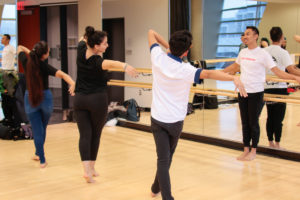Life Moves: Immigrants find community in dance
- Home
- Life Moves
- Life Moves: Immigrants find community in dance

By Sima Chowdhury
The broad ethnic composition of Lai Lai Ballroom Dance studio in southern California inspired Laura Nix to spend six years making her Oscar-nominated short film Walk, Run, Cha Cha. Elena Krifuks from Belarus and her husband, Maksym Kapitanchuk from Ukraine, teach Latin dancing there to mostly middle-aged Asian students. Two of their students are the stars of her film: Paul and Millie Cao, who emigrated from Vietnam. Paul went to the United States as one of the millions of Vietnamese boat people escaping the Communists after the Vietnam War. Settling in the US, he sponsored Millie six years later. With their children grown up, they devote four days a week to ballroom dancing.

Like Paul, Thu Luu, the owner of Ballroom and Country Dance Studio in Calgary, Alberta, escaped Vietnam by boat, arriving in Canada in the early 1980s. As a refugee with no money, learning a new language and ill prepared for Calgary winters, dance provided an escape from the overwhelming experience of life in a new country. During the day he worked as a welder on Calgary’s iconic Scotiabank Saddledome sports arena, while in the evenings he took his first dance lessons at the Arthur Murray Dance Studio. In the late 1990s, Luu bought the studio, renamed it and, after more than 20 years, Ballroom and Country is still part of the city’s landscape. Though he tries to retire, Luu’s home is on the dance floor whether he is in Calgary or at his “retirement” home in Campbell River, British Columbia. When we spoke, he said that when his students are on the floor, his students should have “the precision of German engineering with a splash of Italian flare and Chinese work ethic.”
Luu’s commitment to excellence is surpassed only by his generosity. An instructor emigrating from the Philippines was able to sponsor his family because Luu not only offered him a job, but also provided a place to stay in his basement suite near the studio until they found their own home. A few months before the COVID-19 shutdowns, Yulia, a young woman from Ukraine, wanted a part-time job teaching ballroom to keep up and improve her dancing skills. Coming to Ballroom and Country as both a student and instructor, in Luu she found a “teacher, mentor and a very good friend who will always help in a difficult situation.” She and Luu present the ballroom dance routines to his group classes, which she seamlessly takes over when he travels.

The Dance Centre in Vancouver offers free dance workshops for immigrant and refugee youth as part of an outreach program called Power of Dance. In 2016, they pioneered the Immigrant and Refugee Youth component with Alvin Erasga Tolentino, a contemporary choreographer and the artistic director of Co. ERASGA, to help Syrian refugees adapt to life in Canada. The seven-week program expanded to include youth ages 15-24 from other countries as well. As an immigrant from the Philippines, Tolentino understands some of the struggles these youth face, and the program does its best to accommodate them by providing snacks, transportation and an honorarium for participating. Because the youth can’t all come to The Dance Centre, the workshops travel to them in various communities in the Greater Vancouver area. As well, Tolentino has passed on his experience to new Power of Dance facilitators who, like him, hold space for vulnerable immigrant youth as they explore movement and resilience in their new country.
Tolentino also runs an outreach project for adults, MigARTion, which gives migrant workers an opportunity to express themselves through art. Partnering with Migrante BC, an organization that promotes the rights of Filipino immigrants, MigARTion’s artistic team facilitated workshops in 2018 and 2019, combining music, visual art, theatre and dance. Participants had permission and encouragement to explore their personal histories, reflecting on what being a migrant worker means to them. Tolentino’s plan to take this program across Canada has been temporarily put on hold because of COVID-19 restrictions.
Brazilian author Paulo Coelho wrote, “When you dance you can enjoy the luxury of being yourself.” For immigrants who are often in survival mode, constantly worrying about the future, these opportunities to dance together in a supportive environment offer the mind, body and spirit a chance to be in the moment.

